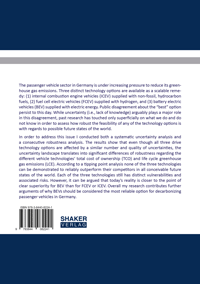
Shop : Details
Shop
Details
48,80 €ISBN 978-3-8440-8224-1Paperback166 Seiten41 Abbildungen246 g21 x 14,8 cmEnglischDissertation
September 2021
Alexander Wanitschke
Are battery electric vehicles the future?
An uncertainty and robustness comparison with hydrogen fuel cell and internal combustion engine vehicles in Germany
The passenger vehicle sector in Germany is under increasing pressure to reduce its greenhouse gas emissions. Three distinct technology options are available as a scalable remedy: (1) internal combustion engine vehicles (ICEV) supplied with non-fossil, hydrocarbon fuels, (2) fuel cell electric vehicles (FCEV) supplied with hydrogen, and (3) battery electric vehicles (BEV) supplied with electric energy. Public disagreement about the “best” option persist to this day. While uncertainty (i.e., lack of knowledge) arguably plays a major role in this disagreement, past research has touched only superficially on what we do and do not know in order to assess how robust the feasibility of any of the technology options is with regards to possible future states of the world.
In order to address this issue I conducted both a systematic uncertainty analysis and a consecutive robustness analysis. The results show that even though all three drive technology options are affected by a similar number and quality of uncertainties, the uncertainty landscape translates into significant differences of robustness regarding the different vehicle technologies' total cost of ownership (TCO) and life cycle greenhouse gas emissions (LCE). According to a tipping point analysis none of the three technologies can be demonstrated to reliably outperform their competitors in all conceivable future states of the world. Each of the three technologies still has distinct vulnerabilities and associated risks. However, it can be argued that today’s reality is closer to the point of clear superiority for BEV than for FCEV or ICEV. Overall my research contributes further arguments of why BEVs should be considered the most reliable option for decarbonizing passenger vehicles in Germany.
In order to address this issue I conducted both a systematic uncertainty analysis and a consecutive robustness analysis. The results show that even though all three drive technology options are affected by a similar number and quality of uncertainties, the uncertainty landscape translates into significant differences of robustness regarding the different vehicle technologies' total cost of ownership (TCO) and life cycle greenhouse gas emissions (LCE). According to a tipping point analysis none of the three technologies can be demonstrated to reliably outperform their competitors in all conceivable future states of the world. Each of the three technologies still has distinct vulnerabilities and associated risks. However, it can be argued that today’s reality is closer to the point of clear superiority for BEV than for FCEV or ICEV. Overall my research contributes further arguments of why BEVs should be considered the most reliable option for decarbonizing passenger vehicles in Germany.
Schlagwörter: Elektromobilität; Energiewende im Verkehr; Verkehrswende; Wasserstoff; synthetische Kraftstoffe
Schriftenreihe der Reiner Lemoine-Stiftung
Herausgegeben von Reiner Lemoine-Stiftung, Neuss
Verfügbare Online-Dokumente zu diesem Titel
DOI 10.2370/9783844082241
Sie benötigen den Adobe Reader, um diese Dateien ansehen zu können. Hier erhalten Sie eine kleine Hilfe und Informationen, zum Download der PDF-Dateien.
Bitte beachten Sie, dass die Online-Dokumente nicht ausdruckbar und nicht editierbar sind.
Bitte beachten Sie auch weitere Informationen unter: Hilfe und Informationen.
Bitte beachten Sie auch weitere Informationen unter: Hilfe und Informationen.
| Dokument |  | Gesamtdokument | ||
| Dateiart |  | |||
| Kosten |  | 36,60 € | ||
| Aktion |  | Zahlungspflichtig kaufen und anzeigen der Datei - 1,6 MB | ||
| Aktion |  | Zahlungspflichtig kaufen und download der Datei - 1,6 MB | ||
| Dokument |  | Inhaltsverzeichnis | ||
| Dateiart |  | |||
| Kosten |  | frei | ||
| Aktion |  | Anzeigen der Datei - 263 kB | ||
| Aktion |  | Download der Datei - 263 kB | ||
Benutzereinstellungen für registrierte Online-Kunden (Online-Dokumente)
Sie können hier Ihre Adressdaten ändern sowie bereits georderte Dokumente erneut aufrufen.
Benutzer
Nicht angemeldet
Export bibliographischer Daten
Shaker Verlag GmbHAm Langen Graben 15a52353 Düren
Mo. - Do. 8:00 Uhr bis 16:00 UhrFr. 8:00 Uhr bis 15:00 Uhr
Kontaktieren Sie uns. Wir helfen Ihnen gerne weiter.



